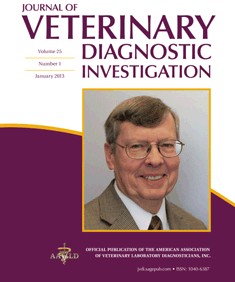
JOURNAL OF VETERINARY DIAGNOSTIC INVESTIGATION
Scope & Guideline
Championing excellence in veterinary diagnostics since 1989.
Introduction
Aims and Scopes
- Veterinary Diagnostics:
The journal emphasizes novel diagnostic techniques and their applications in veterinary medicine, including immunoassays, PCR, and advanced imaging methods. - Pathology and Disease Mechanisms:
Research articles frequently explore the histopathological characteristics of various diseases affecting domestic and wild animals, contributing to the understanding of disease mechanisms. - Zoonotic Diseases and Public Health:
The journal addresses the implications of animal diseases on public health, highlighting studies that investigate zoonotic pathogens and their transmission. - Comparative Medicine:
It promotes comparative studies that enhance understanding of disease processes across species, thereby improving veterinary and human medicine. - Case Reports and Clinical Studies:
The journal includes detailed case reports that provide insights into uncommon diseases, diagnostic challenges, and treatment outcomes in veterinary practice.
Trending and Emerging
- Molecular and Genetic Diagnostics:
There is a significant increase in research focusing on molecular diagnostics and genetic characterization of pathogens, driven by the need for rapid and accurate disease detection. - Point-of-Care Testing Innovations:
Emerging studies are highlighting the development and validation of point-of-care diagnostic tools that enable immediate results in clinical settings, improving patient management. - Immunohistochemistry and Advanced Imaging Techniques:
Research utilizing advanced imaging techniques and immunohistochemical methods to enhance diagnostic accuracy and understand disease pathology is on the rise. - Antimicrobial Resistance Studies:
The journal is seeing a growing number of articles addressing antimicrobial resistance in veterinary medicine, emphasizing the need for surveillance and innovative treatment approaches. - One Health Approach:
Research that integrates human, animal, and environmental health perspectives is becoming increasingly prominent, reflecting a holistic approach to disease surveillance and management.
Declining or Waning
- Traditional Diagnostic Methods:
There is a noticeable decrease in studies focused on traditional diagnostic methods, such as basic histopathology and standard serological assays, as newer technologies gain prominence. - General Pathology Without Specific Focus:
Research that lacks a specific focus or application, such as general pathology without relating to emerging diseases or novel diagnostic methods, appears to be waning. - Non-Veterinary Applications:
Papers exploring veterinary diagnostics in contexts unrelated to animal health, such as purely academic or theoretical approaches, are becoming less common. - Basic Epidemiological Studies:
Studies that provide basic epidemiological data without in-depth analysis or application to diagnostics or clinical outcomes have seen reduced publication frequency.
Similar Journals
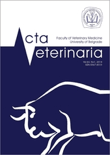
ACTA VETERINARIA-BEOGRAD
Connecting global insights in veterinary studies.ACTA VETERINARIA-BEOGRAD is a distinguished academic journal dedicated to the field of veterinary science, focusing on a broad spectrum of topics pertinent to veterinary medicine and animal health. Published by SCIENDO, this journal has been an open-access resource since 2014, facilitating the dissemination of valuable research findings and innovations to a global audience. With an ISSN of 0567-8315 and an E-ISSN of 1820-7448, it plays a critical role in promoting accessible knowledge in veterinary practices while contributing to the advancement of the field. Located in Poland, this journal notably ranks in the Q3 quartile for veterinary studies, reflecting its ongoing commitment to quality and relevance. The journal welcomes contributions from a diverse range of veterinary disciplines, making it a vital platform for researchers, practitioners, and students alike who aspire to advance their understanding and impact within the veterinary community.

CANADIAN JOURNAL OF VETERINARY RESEARCH-REVUE CANADIENNE DE RECHERCHE VETERINAIRE
Fostering Knowledge, Transforming Veterinary PracticeCanadian Journal of Veterinary Research - Revue Canadienne de Recherche Vétérinaire is a leading publication in the veterinary science community, published by the Canadian Veterinary Medical Association. Established in 1986, the journal serves as a crucial resource for researchers and practitioners alike, covering a broad spectrum of topics pertinent to veterinary medicine and animal health. With a current impact factor placing it in Q2 in the Veterinary (miscellaneous) category, it holds a rank of #85 out of 194 in Scopus for general veterinary research, demonstrating its influence and importance within the field. While the journal is not open access, it remains committed to the dissemination of high-quality research that fosters advancements in veterinary practice and education. Based in Ottawa, Canada, it strives to connect the international community of veterinary researchers and professionals through rigorous peer-reviewed articles that advance knowledge and methodologies in veterinary science.
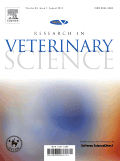
RESEARCH IN VETERINARY SCIENCE
Advancing Veterinary Knowledge for a Healthier TomorrowRESEARCH IN VETERINARY SCIENCE, published by Elsevier Science Ltd, stands as an authoritative platform in the field of veterinary studies. With its origins dating back to 1965, this prestigious journal is recognized for its contribution to the advancement of veterinary knowledge and practices, boasting a remarkable Q1 categorization in Veterinary (miscellaneous) and ranking 24th out of 194 in the Scopus veterinary general category, placing it in the top 13% of its field. The journal presents a diverse range of research articles that explore critical topics in veterinary science, thereby facilitating evidence-based practices and innovations. Although currently not an open-access journal, it remains highly accessible through institutional and personal subscriptions, allowing researchers, professionals, and students to benefit from its rich collection of studies. As it moves toward 2024, RESEARCH IN VETERINARY SCIENCE continues to be a vital resource for those dedicated to improving animal health and advancing veterinary science.

ACTA VETERINARIA BRNO
Pioneering Insights in Veterinary Medicine Since 1974ACTA VETERINARIA BRNO is a distinguished journal published by the Veterinární a farmaceutická univerzita Brno in the Czech Republic, focusing on innovative and scholarly research in the field of veterinary sciences. With an established history dating back to 1974, this journal has evolved to maintain its relevance in contemporary veterinary research, as evidenced by its inclusion in Scopus and a respectable Q3 rank in the miscellaneous veterinary category. Despite operating under traditional access models, ACTA VETERINARIA BRNO remains a vital resource for researchers and practitioners seeking to advance their understanding of veterinary medicine and related disciplines. With its commitment to publishing high-quality, peer-reviewed articles, the journal serves as a crucial platform for disseminating significant findings, thereby contributing to the enhancement of animal health and welfare globally.
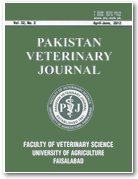
PAKISTAN VETERINARY JOURNAL
Championing excellence in veterinary research since 2009.Pakistan Veterinary Journal (ISSN: 0253-8318, E-ISSN: 2074-7764) is a leading peer-reviewed academic journal published by the University of Agriculture, Faculty of Veterinary Science, situated in Faisalabad, Pakistan. Since its inception, the journal has embraced an Open Access policy, facilitating the dissemination of vital research findings to a global audience and enhancing the visibility of veterinary science. With an impressive Q1 ranking in the veterinary miscellaneous category, the journal ranks #27 out of 194 in the veterinary general field according to Scopus, placing it in the top 14% of the discipline. The scope of the journal encompasses a wide array of topics relevant to veterinary medicine, ensuring that it serves as an essential resource for researchers, professionals, and students alike. By providing a platform for high-quality research from 2009 to 2024, the Pakistan Veterinary Journal continues to play a pivotal role in advancing veterinary science, promoting collaboration among scholars, and addressing contemporary challenges in animal health and welfare.

Journal of Veterinary Science
Driving Excellence in Veterinary Research and Practice.Journal of Veterinary Science, published by the Korean Society of Veterinary Science, is a distinguished peer-reviewed Open Access journal that has been contributing to the field of veterinary medicine since its inception in 2000. With an E-ISSN of 1976-555X, this journal not only provides critical insights for researchers globally but also maintains a strong presence within the academic community, evidenced by its impressive ranking in the Scopus database, where it stands at 44 out of 194 in the general veterinary category, placing it in the 77th percentile. The journal’s impact factor reflects its rigorous standards and the significance of the research it publishes, all while offering unrestricted access to its content since 2006, which promotes the free exchange of knowledge. Situated in the vibrant academic atmosphere of Seoul, South Korea, the Journal of Veterinary Science aims to advance veterinary research and practice, covering a broad spectrum of topics to inspire students, professionals, and established researchers alike to push the boundaries of veterinary science.
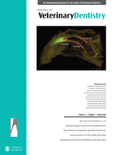
JOURNAL OF VETERINARY DENTISTRY
Transforming Veterinary Dentistry with Insightful ResearchThe JOURNAL OF VETERINARY DENTISTRY, published by SAGE PUBLICATIONS INC, is a pivotal resource in the field of veterinary dentistry, aiming to promote the advancement of this specialized domain through rigorous research and scholarly discourse. With a history dating back to 1988 and serving the veterinary community by providing insightful articles, this journal covers a wide range of topics critical to understanding and improving dental practices in animal care. The journal holds a respectable Q3 ranking in the Veterinary (miscellaneous) category as of 2023, positioning it among notable peers in a competitive field. While currently operating under a traditional access model, its impact is underscored by its relevance to ongoing veterinary education and practice development. Researchers, practitioners, and students alike can benefit from the journal's commitment to disseminating high-quality research that enhances veterinary dentistry standards and practices globally.
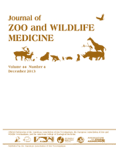
JOURNAL OF ZOO AND WILDLIFE MEDICINE
Connecting professionals for the care of wild species.JOURNAL OF ZOO AND WILDLIFE MEDICINE, published by the American Association of Zoo Veterinarians, serves as a pivotal resource in the field of veterinary science, focusing specifically on the health and well-being of zoo and wildlife species. With an ISSN of 1042-7260 and an E-ISSN of 1937-2825, this journal is recognized for its significant contributions to animal science and has been categorized in the second quartile in both Animal Science and Zoology, as well as Veterinary disciplines, according to the latest rankings. It holds a respectable position within Scopus, being ranked #91 in General Veterinary and #290 in Animal Science and Zoology. While the journal operates on a subscription basis, its impactful research articles have been invaluable for clinicians, researchers, and students alike, providing crucial insights that advance wildlife conservation, veterinary practices, and animal health care from 1993 to the present. With a global reach and a targeted focus on both theoretical and practical applications, JOURNAL OF ZOO AND WILDLIFE MEDICINE is instrumental in fostering collaboration among professionals dedicated to the study and care of wild animal populations.

Revista Romana de Medicina Veterinara
Fostering collaboration for veterinary advancements.Revista Romana de Medicina Veterinara is a leading peer-reviewed journal dedicated to the field of veterinary medicine, published by the General Association of Romanian Veterinarians. With its ISSN 1220-3173 and E-ISSN 2457-7618, the journal aims to advance the domain of veterinary science through dissemination of high-quality research articles, case studies, and reviews that cover a wide array of topics including animal health, veterinary diagnostics, and treatment methodologies. Although primarily focused on the Romanian veterinary landscape, its scope is designed to engage a global audience of researchers, practitioners, and students seeking to enhance their knowledge and practice in veterinary medicine. The journal is committed to open accessibility, ensuring that vital research is readily available to the academic community without financial barriers, thereby encouraging collaboration and innovation. By providing a platform for cutting-edge veterinary research, Revista Romana de Medicina Veterinara plays a crucial role in fostering advancements that can significantly impact animal health and welfare both locally and internationally.

ACTA VETERINARIA SCANDINAVICA
Connecting knowledge for a healthier animal world.ACTA VETERINARIA SCANDINAVICA is a prestigious open-access journal dedicated to advancing the field of veterinary science and promoting interdisciplinary research. Published by BMC since 2001, this journal has become a vital resource for veterinarians, researchers, and students worldwide, with an ISSN of 0044-605X and an E-ISSN of 1751-0147. With a remarkable impact factor reflecting its relevance—ranking in the Q2 quartile for Veterinary (miscellaneous) and Q3 for Medicine (miscellaneous)—ACTA VETERINARIA SCANDINAVICA focuses on a broad spectrum of veterinary topics, ensuring that critical research is available to the academic community and beyond. Located in the United Kingdom, this journal has successfully converged its publishing efforts from 1960 to 2024, highlighting its long-standing commitment to veterinary excellence. Researchers are encouraged to submit their work through the journal’s user-friendly platform, contributing to the ever-evolving landscape of animal health and welfare.